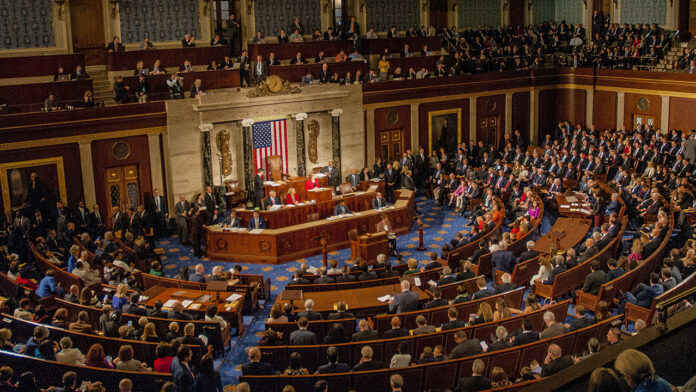The United States House of Representatives has begun a comprehensive investigation into the rising allegations of genocide and targeted religious killings in Nigeria. The move follows the recent decision by US President Donald Trump to redesignate Nigeria as a Country of Particular Concern (CPC), a classification reserved for nations accused of severe violations of religious freedom.
The public hearing is scheduled for Thursday, November 20, 2025, at 11:00 a.m. in Room 2172 of the Rayburn House Office Building in Washington, D.C. It will be conducted by the House Subcommittee on Africa, chaired by long-standing African affairs advocate Representative Chris Smith. The session will also be streamed live to allow global audiences follow the discussions.
The CPC label, if approved by the US Senate, grants the American government the authority to impose a wide range of penalties on Nigerian officials considered complicit in religious persecution. These penalties may include visa bans, financial sanctions, restricted security cooperation, and limits on certain forms of bilateral assistance. It also sends a powerful diplomatic message that the situation in Nigeria is deteriorating and requires urgent international attention.
Documents shared with members of the Committee on Foreign Affairs indicate that the hearing will feature two separate panels. The first panel will bring in senior officials from the US State Department, specifically:
Jonathan Pratt, Senior Bureau Official for the Bureau of African Affairs
Jacob McGee, Deputy Assistant Secretary in the Bureau of Democracy, Human Rights, and Labor
These officials are expected to brief lawmakers on the information that influenced President Trump’s decision, the current security outlook in Nigeria, and the next steps the US may take if the CPC designation is ratified.
The second panel will include individuals with direct experience and long-term involvement in issues of religious rights and insecurity in Nigeria. Among them are:
Nina Shea, Director of the Center for Religious Freedom
Bishop Wilfred Anagbe, head of the Makurdi Catholic Diocese in Benue State
Oge Onubogu, Africa Program Director at the Centre for Strategic & International Studies (CSIS)
These witnesses are expected to give firsthand accounts of violence, attacks on churches, and the humanitarian situation in communities affected by prolonged conflict.
President Trump first made the CPC declaration against Nigeria on October 31, 2025, citing what he described as severe and ongoing violations of religious freedom. He particularly pointed to the alarming rate of attacks on Christian communities across regions such as the Middle Belt and parts of northern Nigeria.
“Nigeria is facing a massive religious crisis,” Trump had said. “Christianity is under existential threat, and thousands of Christians are being killed by radical Islamists.”
Though Nigeria has long rejected allegations of genocide or targeted religious persecution, global human rights groups have repeatedly reported increasing violence that often takes on religious dimensions. Attacks by armed groups, including bandits, unknown gunmen, and extremist organisations, have caused thousands of deaths over the past decade. Many rural communities have been displaced, and churches and farmlands destroyed.
The situation has drawn deeper international concern because Nigeria is Africa’s most populous country and is considered a key US partner in security, trade, and counter-terrorism efforts. Any instability in Nigeria is believed to have potential ripple effects across West Africa.
In his declaration, President Trump issued an unusually strong warning to President Bola Tinubu’s administration. He said the US was prepared to halt all assistance to Nigeria if the killings continued. More controversially, he said the US might consider military intervention if the Nigerian government failed to act decisively.
“If the Nigerian Government continues to allow the killing of Christians, the USA will immediately stop all aid and assistance to Nigeria,” Trump said. “And may very well go into that now-disgraced country, ‘guns-a-blazing’, to completely wipe out the Islamic terrorists who are committing these horrible atrocities.”
He added that he had directed the “Department of War”—a phrasing that drew significant media attention—to prepare for “possible action.”
“If we attack, it will be fast, vicious, and sweet, just like the terrorist thugs attack our cherished Christians,” the US President said.
These statements have sparked serious debate both within Nigeria and internationally. Critics argue that such threats could worsen diplomatic relations and create unnecessary fear. Supporters, however, say the strong stance is overdue, given the long-running violence in parts of the country.
The redesignation has drawn mixed reactions across Nigeria. Some Christian groups have welcomed the move, saying it draws global attention to what they describe as years of unchecked killings. They argue that the Nigerian government has not done enough to protect communities from attacks by extremist groups, armed herders, and other violent actors.
The Tinubu administration has rejected suggestions that it is permitting religious persecution. Government spokespersons have insisted that the security challenges facing Nigeria—whether banditry, terrorism, or communal conflict—are complex and not driven solely by religion. They argue that the government is already investing heavily in security reforms and military operations.
Nigeria has experienced similar pressure in the past. In 2020, under Trump’s previous administration, the country was first placed on the CPC list. However, the designation was removed in 2021 by President Joe Biden, who argued that Nigeria had made progress and that the classification was unnecessary at the time.
The return of the CPC label in 2025 suggests that Washington now believes conditions have worsened significantly.
The upcoming hearing is expected to shape the next stage of US-Nigeria relations. Policy experts say the questions posed by lawmakers may reveal whether the US plans to introduce sanctions soon or whether it will leave room for diplomatic solutions.
The involvement of Nigerian religious leaders, especially Bishop Anagbe who has often spoken about killings in Benue and other Middle Belt states, suggests that the hearing will highlight voices from communities directly affected.
For many Nigerians, especially those living in conflict-prone areas, the hearing represents an opportunity for their struggles to be acknowledged on the global stage.

